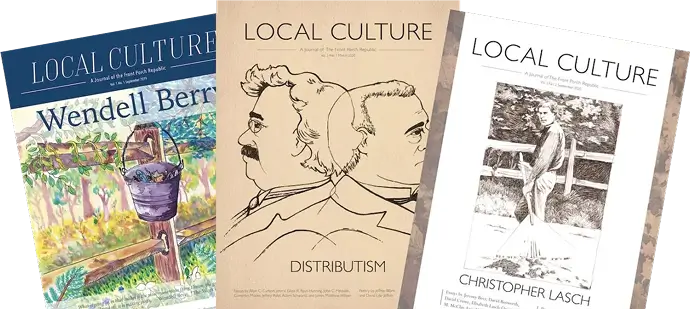The Nightstand 453
Pilgrims Longing for Home
As someone who appreciates the value of place, rootedness, and limitations on my horizon of vision, I’m afflicted with deep sense of unease as to the nature of my own…
Rethinking the Local vs. Global Divide
In Down to Earth: Politics in the New Climatic Regime, Bruno Latour provides a challenging but potentially hopeful take on why climate denial continues to be a political force. For him,…
The Crisis of Love in a Global Age
Any longtime reader of Wendell Berry’s work recognizes two of the many animating forces that give his writing its emotional resonance. These two forces, these two genii loci, revolve around Berry’s approach…
Narrating the Tradition of Liberalism’s Anti-Tradition
Criticizing the current liberal order is a popular activity. Authors such as Patrick Deneen, Rod Dreher, D.C. Schindler, Mark Lilla, Johnathan Haidt, and Jordan Peterson have generated significant conversation through…
Spirits of Place
John Gatta is the William B. Kenan Jr. Professor of English at Sewanee: The University of the South. He’s the author of several excellent books, including Making Nature Sacred: Literature, Religion,…
Avoiding “A World Without Women,” or Porches
A common and often valid critique of many families in the homeschooling movement is that, because of a lingering obsession on, and invisible competition with, the thing they are leaving…
Instability and the Noonday Devil
In a lecture on monastic stability delivered at the 2015 Front Porch Republic conference, Benedictine monk Gerard D’Souza noted that the idea of staying in one place for the rest of…
Food and “the job of getting it there”
In Charles Frazier’s 1997 novel Cold Mountain, a minister’s daughter decides after her father’s death to remain on their western North Carolina farm, rather than return to the genteel life…
The Cornhusker Berryian: Ben Sasse’s Argument for Rootedness
It was said of the late Senator Daniel Patrick Moynihan (D-NY) that he had written more books than most senators had read. Senator Ben Sasse (R-NE) seems to aspire to…
Leo Durocher: The All-American Contradiction
The coming of October, and of the World Series as culmination, invites reflection on yet another season in which the home run (and the strikeout) became the centerpiece of the…
Nationalism Against Imperialism
“For centuries, the politics of Western nations have been characterized by a struggle between two antithetical vision of world order: an order of free and independent nations, each pursuing the…
Can You (or anyone) Put Wendell Berry’s Lightning in the Bottle of U.S. Higher Education?
Below is the text of a review for Orthodox Presbyterians -- of all people -- of Jack Baker and Jeff Bilbro's new book on Wendell Berry (some words have been…
Love in the Place of Almost Death
At the height of the political tension in King Lear, the corrupt usurpers of Lear’s throne are at the helm of Britain’s defense against French invaders. Cordelia, Lear’s truly beloved…
Learning to Distinguish between Demonic and Redemptive Technologies
In a recent essay for Christianity Today, “Do All Plants Go to Heaven?,” Abigail Murrish speculates that GMOs might be present in the New Jerusalem. It’s certainly an interesting question.…
Blowing Up the Bert: The Outside Story
Two years ago I witnessed the abrupt transformation of an old and distinguished literary magazine. For the people doing the transforming, of course, the changes were long overdue. The overhaul…
Educating Humans to Subvert Technocracy
Alan Jacobs’s new book, The Year of Our Lord 1943: Christian Humanism in an Age of Crisis, traces a fascinating intellectual debate that arose on the Western home front during…
Redeeming Capitalism is an Uphill Battle
Recently there has been a growing sense that capitalism is at best a mixed blessing. Though the material benefits that accompany its massive wealth creation are real and significant, capitalism…
My Àntonia at One Hundred
Willa Cather is the quintessential novelist of the American prairie. That distinction comes to her first because she spent her formative years on the prairie in Red Cloud, Nebraska. Cather…
Love in the Void: A New Collection of Simone Weil’s Writings
This selection of writings aims to make manifest to the reader Simone Weil’s “intensity in the pursuit of truth” and the “sense of the eternal which Weil had to an…
Catastrophe, Technology, Limits, and Localism
[Cross-posted to In Medias Res] Charles C. Mann's The Wizard and the Prophet, published earlier this year, is a fabulous book. Not a perfect book; sometimes, in order to bulk…
Social Isolation as the Fruit of Liberalism
Loneliness is on the rise. Suicide is one of the leading causes of death among young people. Our social media networks may number in the hundreds, even thousands, but it…
The Formative Power of Metrics
Living in an age where information is merely a click (or swipe) away, we are inundated with metrics. Quantitative data is directed our way at alarming speeds leaving us unable to…
The Cost of Knowing One’s Place
The first time you read the novels of Thomas Hardy–especially if you read them as a young adult–you’re likely to get a pretty forceful impression. With the story-telling powers of…
What Do Farmers Want?
[Cross-posted to In Medias Res] The obvious response to the title of this post is: I don't know; why don't you ask one? Well, Robert Wuthnow and his researchers did,…













